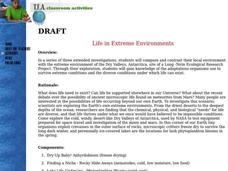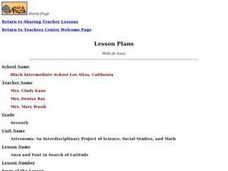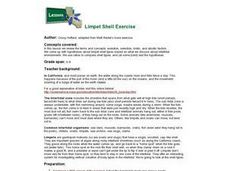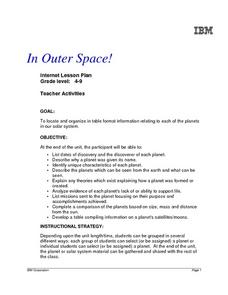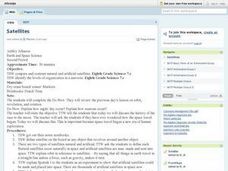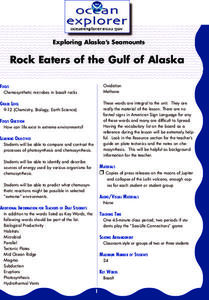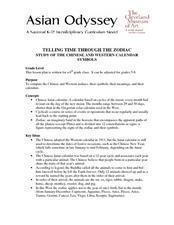Curated OER
Understanding Climate
Fourth graders create two dioramas out of household materials to compare the influence of various factors that impact climate. Each group discuss how the change in factors influenced the climate, flora, and fauna of their area.
Curated OER
Regolith Formation
Students compare and contrast the process of regolith formations. In groups, students define regolith and discover how regolith is formed on the Earth and on the Moon. They participate in experimental activities to simulate regolith.
Curated OER
Our Solar System
In this solar system learning exercise, students read about the planets, asteroids, meteoroids, comets, and the moon. Then students complete 25 multiple choice, 4 true or false, and 3 short answer questions.
Curated OER
Making a Crater
Students examine the characteristics of craters. In this crater lesson, students discover how meteors form craters on planets and moons as they make their own craters and respond to observational questions regarding the scientific...
Curated OER
Charting Seasonal Changes
Students research the Earth's patterns of rotation and revolution, create a chart and graph of these patterns and use them to explain the causes of night and day and summer and winter.
Curated OER
Solar System Slide Show
Students work in small groups to research a planet in our Solar System in order to compare it to Earth. They examine the planet's size, atmosphere, rotation and revolution periods, temperature, and other attributes. They collect...
Curated OER
Central Tendency
Fifth graders compare and contrast different sets of data on the basis of measures of central tendency.
Curated OER
Seesaws
Students make direct comparisons between objects using balance and spring scales. They also are encouraged to estimate which object is heavier by holding the objects before using the balance scales. Comparing the masses of objects is the...
Curated OER
Clay Planets
Students create scale models of the planets out of clay and compare them to the real planets.
Curated OER
What's Up?
Students compare and contrast the various heavenly bodies found in the sky at night. They identify the moon and stars in the sky as well as how the stars form pictures called constellations. Students also experiment with reflection and...
Curated OER
Celebrate The Four Seasons
Students investigate cause and effect and compare and contrast how recurring cycles are evident in multiple aspects of their education. They answer questions in the chosen field. Students model each aspect by interpreting, perceiving and...
Curated OER
Life in Extreme Environments
Students compare and contrast local environments with the extreme environment of the Dry Valleys, Antarctica. Students explore and gain knowledge of the adaptations organisms use to survive extreme conditions and the diverse conditions...
Curated OER
Anza and Font in Search of Latitude
This is an integrated lesson that incorporates Social Studies, Science, and Mathematics. In Social Studies, 7th graders complete an online interview and complete an online worksheet about latitude of sites on the Anza trail. In Science...
Curated OER
Limpet Shell Exercise
Students review the terms and concepts: evolution, selection, biotic, and abiotic factors. They come up with hypotheses about limpet shell types based on what we discuss about intertidal environments. Students use ratios to compare...
Curated OER
The Best of the Solar System (Grades 4-7)
Students explore planetary research and become familiar with the planets and their characteristics. They compare and contrasts planets and moons.
Curated OER
Exploring the Planets
Sixth graders explore the planets through an interactive web site. In this astronomy based lesson, 6th graders compare planets, explore comets, and discover planet facts through a variety of activities provided by the Smithsonian Museum.
Curated OER
In Outer Space
Students use the internet to gather information on the solar system. They identify the discoverer and unique characteristics of each planet. They compare and contrast each planet based on size, mass, and distance from the sun. They...
Curated OER
Properties of Rocks
Students compare the properties of rocks. They identify objects made of rocky materials such as walls, sidewalks, etc. Students describe and group rocks based on their characteristics.
Curated OER
Moving and Growing
Students learn to understand the role of both skeletons and exoskeletons. In this lesson on exoskeletons, students locate and label bones on diagram of a human skeleton, and observe and discuss bones of chicken and fish. Students then...
Curated OER
Gravity
Sixth graders explore the characteristics of gravity. They discuss gravity on Earth and then use cereal boxes to research and compare the weight of objects on Earth to the weight of those objects on other planets.
Curated OER
As the World Turns
Third graders read books and participate in class discussions about the motion of the stars and planets and moons in relation to the Earth. In small groups, 3rd graders act out these movements to music.
Curated OER
Satellites
Eighth graders explore the history of space travel and satellites. Through a teacher demonstration, 8th graders observe how a satellite revolves another object. They identify natural and artificial satellites, explore how satellites...
Curated OER
Rock Eaters of the Gulf of Alaska
Students compare and contrast the processes of photosynthesis and chemosynthesis. They identify and describe sources of energy used by various organisms for chemosynthesis.
Curated OER
Telling Time Through the Zodiac
Middle schoolers compare the Chinese and Western zodiacs, their symbols, their meanings, and their calendars through a in-class discussion and a small group project. This lesson plan includes vocabulary and extensions.










